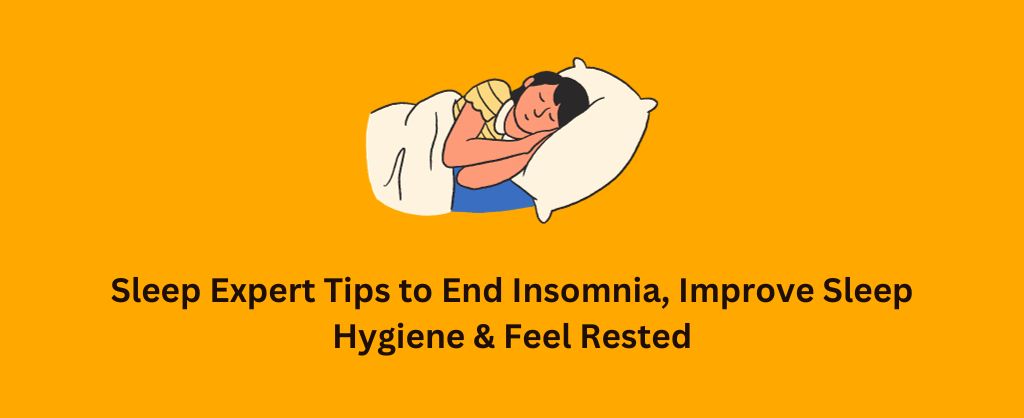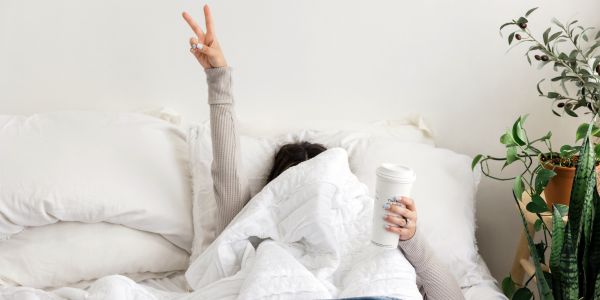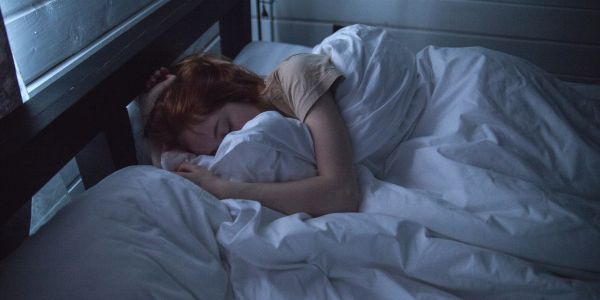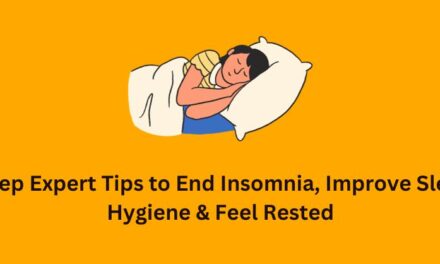25+ Science-Backed Tips for Restful, Quality Sleep Each Night

We’ve all been there – tossing and turning in bed, mind racing and body restless. Sleep trouble is incredibly common, with around 30% of adults dealing with insomnia symptoms.
Lack of quality sleep leaves you feeling groggy, irritable and unable to focus the next day. Over time, it can take a serious toll on your physical and mental health.
Tips for Getting a Good Night’s Sleep
The good news is there are many effective techniques to help you fall asleep faster and wake up more refreshed.
With some simple lifestyle changes and smart sleep habits, you can take control of your sleep and feel like your best self during the day. In this article, we’ll explore proven strategies for getting better shuteye.
Ready to stop counting sheep and start drifting off? Let’s get started!
Set Yourself Up for Sleep Success
First things first – set yourself up for sleep success by optimizing your sleep environment and habits. Keep your bedroom cool, dark and quiet. Invest in a comfortable mattress and bedding. Make sure your room is relaxing and used solely for sleep and intimacy.
Avoid screens and digital devices in the bedroom – the blue light they emit disrupts your circadian rhythms. Your brain associates the bedroom with sleep, so keep it tech-free. Speaking of tech, don’t watch TV or movies right before bed. The audiovisual stimulation is too activating for the brain.
Be careful what you consume in the evening too. Avoid heavy meals late at night – give your body time to digest before lying down. Limit caffeine and alcohol close to bedtime as they can disrupt sleep. Nicotine and stimulants like ADHD medications are also no-nos.
Sticking to a regular sleep schedule helps tremendously. Go to bed and wake up at the same time daily, even weekends, to reinforce your body’s sleep-wake cycle. Our bodies crave consistency.
Relaxation is Key to a Good Night Sleep
It’s hard to drift off if you’re stressed and anxious. Relaxation techniques are crucial for quieting both the mind and body pre-bedtime.
There are many relaxing rituals to try:
- Taking a warm bath or shower to send the signal it’s time for bed. The post-bath drop in body temperature makes you sleepy.
- Listening to soothing music or nature sounds. White noise blocks disruptive sounds too.
- Lighting candles or using essential oils like lavender to create a Zen environment.
- Practicing deep breathing exercises to lower stress hormones. Inhale deeply through the nose, exhale slowly through the mouth.
- Progressive muscle relaxation starting from your toes to your head. Tense and release each muscle group.
- Meditating to clear your mind of unwanted thoughts. Apps like Headspace provide helpful guided meditations.
- Sipping caffeine-free herbal tea like chamomile or peppermint.
- Doing gentle yoga poses and stretches to release physical tension. Child’s pose, legs up the wall, and forward folds are calming poses.
- Giving yourself a hand or foot massage with lotion to relax tense areas.
Find what relaxation techniques resonate with you most and make them part of your pre-bed wind down routine.
The Power of Preparation
Getting ready for the next day ahead of time can help minimize stressful thoughts when your head hits the pillow. Make a to-do list or lay out your outfit and bags. Prepack lunches and double check your schedule.
Tackle any worrying tasks on your mind so you don’t stay up obsessing over them. Send that email you’ve been putting off or finish that presentation. Get your ducks in a row so you can detach at bedtime.
It also helps to power down your brain for the night. Don’t do work, pay bills or have important discussions right before bed. Read a light book, listen to music or do a puzzle – something that doesn’t rev up your brain. Jot down racing thoughts in a journal to help release them.
How to Fall Asleep Faster and Wake Up Refreshed
Bedtime Best Practices
Once it’s go time, following these sleep guidelines can help you fall asleep faster.:
- Only go to bed when sleepy. Tossing and turning for more than 20 minutes? Get up and do a relaxing activity until you feel tired. Don’t force sleep.
- Disconnect fully – no phones or TV. Let your mind unwind sans stimulation and distraction.
- Avoid clock watching. Staring at the time during insomnia only breeds anxiety. Hide clocks so you’re not tempted.
- Make sure the room is cool – around 65°F. Hot environments disrupt sleep.
- Stick to a soothing low-light ambience. Bright overhead lighting tells the brain it’s time to wake up.
- Do a quick 10 minute meditation in bed to clear any mental chatter.
- Only use your bed for sleeping to associate it with rest. Don’t eat, work, watch TV or stress here.
- Get comfy with supportive pillows and breathable bedding. Don’t put up with an uncomfortable mattress.
Follow this bedtime routine for about an hour before getting into bed in the same order nightly. Rituals give your body cues to start producing sleep hormones. Over time you’ll find yourself getting sleepy just thinking about your new routine.
Be Kind to Yourself
Self-care isn’t just a buzzword – when it comes to improving sleep, it’s a necessity. How you treat your body and mind during the day has a big impact on how well you sleep at night.
Prioritize daily movement – it helps reduce cortisol and tire you out before bed. Just avoid vigorous exercise a few hours before bedtime as it has an activating effect.
Manage stress through relaxing hobbies, sufficient down time and saying no when needed. Unmanaged stress and burnout wreak havoc on sleep.
Spend time outdoors and expose yourself to natural light, especially earlier in the day. Sunlight helps regulate your internal clock.
Consume foods that provide steady energy, not sugar highs and crashes. Limit caffeine to mornings. Stay hydrated but avoid fluids close to bedtime.
Give yourself permission to say no to evening obligations if they’ll keep you up too late. Protect your sleep schedule.
Most importantly, be patient and compassionate with yourself. Change takes time. If you have an off night, chalk it up to being human. The tips above will lead to restful nights in due time.
When Sleep Just Won’t Come
We all experience occasional insomnia woes. These strategies can help you get back on track when sleep proves elusive:
Get out of bed if you haven’t fallen asleep after 15-20 minutes. Do calming activities elsewhere, then return to bed when sleepy. You want to associate bed with falling asleep quickly.
Do a brain dump. Write down thoughts racing through your mind. Once they’re on paper, give yourself permission to let them go.
Practice square breathing. Inhale for 4 seconds, hold for 4, exhale for 4. Repeat until relaxed.
Rub a few drops of lavender oil between your palms and deeply inhale the aroma. Lavender is very soothing.
Try the “reverse worry” technique. Instead of worrying about not sleeping, worry that you’ll fall asleep too fast and miss out on productive time! Reverse psychology to quiet anxious thoughts.
Visualize relaxing images like a beach, forest or calming memory. Picture details vividly. This occupies the mind in a pleasant way.
Listen to sleep meditations or bedtime stories. Get lost in the narrative and let your mind wander from its worries.
Allow body scanning to relax each area. Start at your toes and slowly pay attention to each body part up to your head.
Remember nights of good sleep. Your body knows how to sleep well and will again soon. This too shall pass.
Breathe slowly and deeply in a 4-7-8 pattern – inhale for 4 counts, hold for 7, exhale fully for 8. The long exhale triggers relaxation.
Press pressure points like under the nose, between thumb and forefinger, on earlobes or top of the foot. Hold for several seconds and repeat.
Visualize your happy place. Picture somewhere you feel relaxed as vividly as possible using all your senses.
Say reassuring words like “I can handle this one sleepless night. I’ve had them before and always get through it. I will fall asleep again soon.”
Try cuddling a weighted blanket or plush animal. The gentle pressure soothes the nervous system.
With consistent use of such tools in your toolkit, occasional insomnia is manageable. You’ll be snoozing soundly again sooner than later.
Seek Professional Help if Required
For those with more persistent sleep troubles, it may be time to seek professional treatment. Chronic insomnia is linked to numerous health problems – don’t neglect it.
Speak with your doctor about underlying issues like:
- Sleep apnea – interrupted oxygen during sleep. A sleep study can help diagnose.
- Restless leg syndrome – uncomfortable limb sensations that keep you awake.
- Hormone imbalances like low iron, overactive thyroid or menopause changes. Blood work can check levels.
- Mental health conditions like depression, anxiety and PTSD. Therapy provides helpful tools.
- Chronic health issues causing pain or discomfort at night. Treatment can improve sleep.
- Certain medications that interfere with sleep as a side effect. Your doctor can adjust dosage schedule.
- Substance abuse issues with alcohol, nicotine or sleep aids. Seek counseling and treatment.
If all medical issues have been ruled out, your doctor may recommend meeting with a sleep specialist for insomnia therapy.
Ask for a referral to a certified behavioral sleep medicine expert. They offer techniques like:
- Cognitive behavioral therapy (CBT) for insomnia to modify unhelpful thoughts and behaviors that disrupt sleep. Online CBT programs like Sleepio are accessible options.
- Stimulus control therapy to reinforce healthy sleep habits and bedtime conditioning.
- Relaxation training for body and mind like mindfulness, meditation and hypnosis.
- Advice on sleep hygiene, routines and environmental factors.
- Gradual sleep restriction and sleep compression to improve sleep drive.
- Light therapy to balance circadian rhythms.
- Biofeedback to reduce sympathetic “fight or flight” arousal.
As a last resort, they may prescribe sleep medications on a short term basis to get sleep back on track while you work on behavioral modifications. Take medication under their guidance only – long term use can be habit forming.
The Bottom Line
Quality sleep plays a huge role in health, mood and daily performance. Prioritize it and seek help when needed. Consistency is key with sleep tips – make them lifetime habits, not just one off attempts.
Be patient and believe your body knows how to sleep well. Relax and retrain your brain to associate bed with restfulness. Sweet dreams will come! Now turn off that phone and get some rest.














